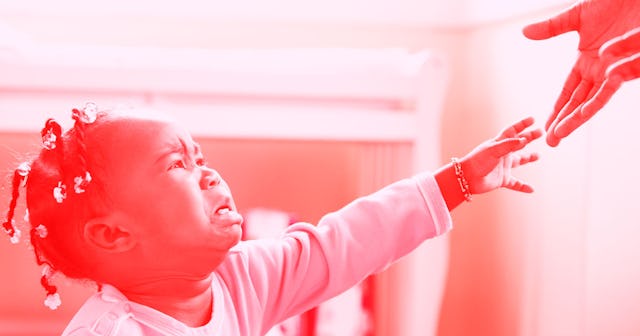I Stopped Apologizing For My 2-Year-Old's Tantrums — And So Should You

The “terrible two” stage, up to today, was an unknown territory for me — as my oldest completely skipped that stage and we only went through a little “three-nager” attitude and sass phase. But when my son turned two, everything changed. I mean everything.
My little baby was no longer toddling around and being shy. My two-year old was now climbing, running, jumping, screeching (very loudly, I may add), and saying NO to everything. I was now tackling a baby alligator while changing diapers and negotiating with a two-year old for what seemed to be everything. And so it began: the terrible two stage that I had read about and dreaded had come in headstrong.
I quickly did my research — “Is a two-nager a thing,” “Is it normal for my two-year old to act happy one second and then angry the next,” “How do I calm an angry two-year old,” “Do I just give in,” and finally “Help!” If I could show you my Google search history during this transition, you would need a couple hours to read it. But after all this exhaustive research, I came to one conclusion: I had to stop apologizing for my two-year-old’s high energy and tantrums, and here is why.
Apparently the high energy, defiant behavior, frustration and the intensity of the tantrums were all very normal behaviors for two-year-old children. In this period of their life, as much as we question what we are doing wrong as parents and why our kids are not listening to us, it has nothing to do with us and our parenting styles.
yaoinlove/Getty
Kids are developing so much during this period, and listening skills are being learned — but it will take time, until their brain can actually physically do that. With this research in hand and some tips on how to help my child cope, I felt more confident in stopping myself from apologizing every time my son randomly screeched in the middle of the grocery store or threw a tantrum in the Target aisles. As much as I felt embarrassed and wanted to cry I knew that my two-year-old was just … being a two-year-old.
As parents, we are always quick to apologize for what our kids do, and we sometimes blame ourselves for how they may behave. I know I did. It’s so easy to feel judged, or like you’re a bad mom. But in reality, these little ones are just being normal toddlers, doing normal developmental things, and anyone who’s ever had a two-year-old can understand that.
I’m not condoning misbehavior, because so many other factors are in play such as their age. But at two years old, I don’t think my child wants to ruin my life and get me upset by not listening.
These first few years are our kids’ first lessons on how to react to life. My son is just a baby still, with no physical control over his emotions — and the way he handles those big feelings is sometimes out of my control. It’s so triggering for me to see comments on parenting sites that say “well, you failed as a mother because your one-year-old should know better than to do that.” I’m baffled every time that society thinks that babies should know to stop crying, throwing tantrums and to learn to sleep on command. If parenting were that easy, we wouldn’t all be complaining about how hard it was.
Next time you see a parent struggling with a two-year-old who is throwing a tantrum, screeching, or not listening, don’t judge; just support them with a smile or even a “You’re doing a great job.” Because you know what? The child’s behavior doesn’t say anything about their parenting.
Let’s stop apologizing for our children who are just behaving appropriately for their age. We can’t expect our children to behave and control their emotions when — let’s be real — many adults can’t even do that. We put so much pressure on children and parents, which only makes it that much more difficult to be a child and a parent. Let’s stop apologizing for our young children’s behavior and support each other through it instead.